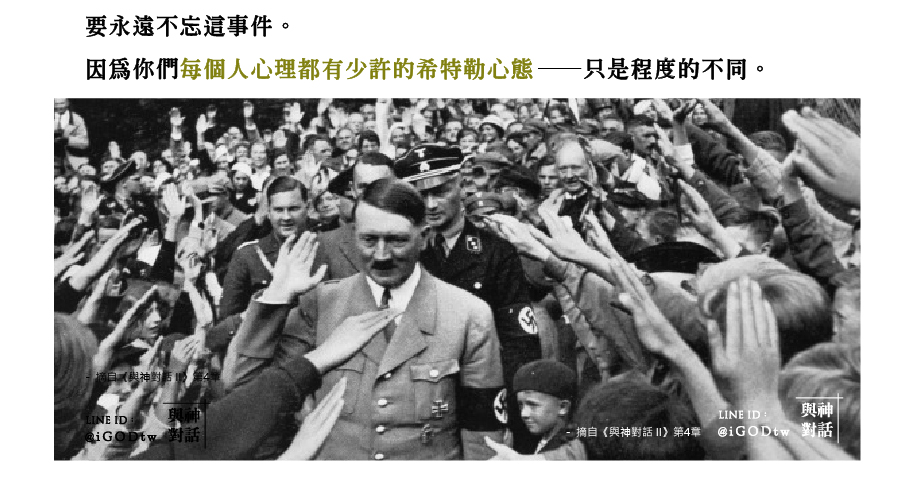
摘自《與神對話 II》:無法體會別人的痛苦像自己的痛苦那般,是使得痛苦繼續不斷的原因。分別心孕育漠不關心和虛假的優越感。這在你們星球上不斷發生的事件——已經三千年一成不變了——是你們星球上的人群之「集體意識」的反映。
因此,無論你們在哪裡、無論你們做什麼,如果你們希望在地球上大部分的生活經驗是和諧的,你們就必須永遠都要致力於「群體意識的創造」。然而,群體意識(group consciousness)是個尚未廣泛被人了解和正視的東西…… 歡迎檢視第七篇【完整了解「希特勒為何上天堂?」系列摘文】- 7/10:
神:【「希特勒經驗」是人類群體意識之反映】
【完整了解「希特勒為何上天堂?」系列摘文】-7/10

無法體會別人的痛苦像自己的痛苦那般,是使得痛苦繼續不斷的原因。
分別心孕育漠不關心、虛假的優越感。(Separation breeds indifference, false superiority.)
在你們星球上所發生的事件——已經三千年一成不變了——如我說的,是你們群體——你們整個星球上的人群——的集體意識(Collective Consciousness)之反映。
描述這個層次的意識最好的形容詞就是「原始」(primitive)。
尼爾:嗯,沒錯。不過,我們好像又脫離了原來的問題。
並沒有真的脫離主題。你問希特勒的事。讓「希特勒經驗」之所以可能發生,是一個群體意識的結果(a result of group consciousness)。許多人說希特勒操縱了群體——也就是他的國人——利用他的狡詐和善於雄辯。但這是個方便把一切罪過全推到希特勒身上的說法——而那正是人民群眾所要的。
但如果不是數以百萬計的民眾對他的支持與合作,並願意提交屈從,則希特勒根本無法做。那自稱為德國的小群眾,必須為這大屠殺成擔巨大的責任。同樣地,稱為人類的大群眾,也必須在某個程度上承擔這責任。因為人類大眾什麼也沒做,允許自己無動於衷,對於發生在德國的悲慘事件麻木不仁——直至其規模達到如此巨大,以至連最冷漠的分離主義者也無法再漠視才開始關心。

所以你明白嗎,是「集體意識」提供了納粹運動的沃土。希特勒是抓住了那時機,但並不是他創造了那時機。
了解這裡的教訓是非常重要的。一個常年不斷在強調分離和優越感的群體意識,會大規模地產生悲憫心的喪失,而悲憫心的喪失會無可避免地隨之喪失良心。
以嚴格的民族主義為基礎的集體概念,會忽視他人的困境,而要所有的別人為你們的困境負責,以此方式合理化自己的報復、「糾正」和戰爭行為。
奧許維茨集中營(Auschwitz)是納粹解決問題的方式——一種試圖「糾正」所謂「猶太問題」的辦法。
「希特勒經驗」的可怕並非在他把此經驗加諸於人類身上,而是在人類允許他那樣做。
令人驚愕的是,不僅有一位希特勒的出現,而且是有這麼多位其他人的附合跟隨。
使人感到羞恥的不僅是希特勒屠已殺了上百萬猶太人,而且是還有上百萬的猶太人必須被屠殺,才使得希特勒被迫住手。
「希特勒經驗」的效用(目的),是向人類顯露人性的面貌。(The purpose of the Hitler Experience was to show humanity to itself.)
摘自《與神對話 II》第4章

The inability to experience the suffering of another as one’s own is what allows such suffering to continue.
Separation breeds indifference, false superiority. Unity produces compassion, genuine equality.
The events which occur on your planet—which have occurred regularly for 3,000 years—are, as I’ve said, a reflection of the Collective Consciousness of “your group”— the whole group on your planet.
That level of consciousness could best be described as primitive.
Neale: Hmmm. Yes. But we seem to have digressed here from the original question.
Not really. You asked about Hitler. The Hitler Experience was made possible as a result of group consciousness. Many people want to say that Hitler manipulated a group—in this case, his countrymen—through the cunning and the mastery of his rhetoric. But this conveniently lays all the blame at Hitler’s feet—which is exactly where the mass of the people want it.
But Hitler could do nothing without the cooperation and support and willing submission of millions of people. The subgroup which called itself Germans must assume an enormous burden of responsibility for the Holocaust. As must, to some degree, the larger group called Humans, which, if it did nothing else, allowed itself to remain indifferent and apathetic to the suffering in Germany until it reached so massive a scale that even the most cold-hearted isolationists could no longer ignore it.
You see, it was collective consciousness which provided fertile soil for the growth of the Nazi movement. Hitler seized the moment, but he did not create it.
It’s important to understand the lesson here. A group consciousness which speaks constantly of separation and superiority produces loss of compassion on a massive scale, and loss of compassion is inevitably followed by loss of conscience.
A collective concept rooted in strict nationalism ignores the plights of others, yet makes everyone else responsible for yours, thus justifying retaliation, “rectification,” and war.
Auschwitz was the Nazi solution to—an attempt to “rectify”—the “Jewish Problem.”
The horror of the Hitler Experience was not that he perpetrated it on the human race, but that the human race allowed him to.
The astonishment is not only that a Hitler came along, but also that so many others went along.
The shame is not only that Hitler killed millions of Jews, but also that millions of Jews had to be killed before Hitler was stopped.
The purpose of the Hitler Experience was to show humanity to itself.

